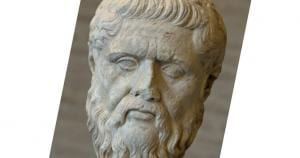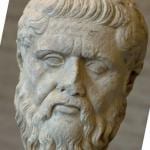 What is happening?
What is happening?
If we wish to follow the Logos where He leads, we need to listen to critics, especially those with interesting things to say. Jeff Williams is a critic of metaphysics. A University of Chicago grad, he agreed to present his argument and I have posted it here unedited (except for some formatting and the title). As result of his rejection of metaphysics, he rejects objective moral law as an illusion.
Mr. Williams previously argued that Athens has no need of Jerusalem, which contributes nothing good to Western civilization. I responded and enjoyed the interaction immensely. Mr. Williams has taken the time to discuss Martin Heidegger, a philosopher not much in favor when I was in graduate school. I have enjoyed reading more Heidegger (alas in translation). As usual, I will allow this post to stand on its own for a time and then respond, linking to the response.
Thank you for this careful work Mr. Williams!
The Metaphysical Illusion of Objective Moral Law
Most Christian Apologists claim an objective God-given moral law. Its ontology, however, is confused in that this objective law would necessarily lie outside any individual subjectivity as an external, immutable, and verifiable object. At the same time, it is somehow accessible to all even though nobody has ever actually seen it. The explanation for that is usually a muddle claiming it is “written in our soul” which now turns it into subjective knowledge from internal sensibility, with no corresponding objective cause, of something that is supposed to be purely objective. This muddle is inherent in the Medieval Scholastic metaphysics from which it springs.
When late in life Martin Heidegger was asked why he had never written on the topic of morality, he answered that we don’t yet even know the right questions to ask. In fact, there probably is no more desolate area in all of philosophy than morality. What Heidegger pointed to, however, is the necessity of an authentic inquiry into the essence of Being through an inquiry of our own essential nature as a part of Being, and Heideggerian ontology provides the means for escaping the inevitable muddle of metaphysics. We will compare the Heideggerian question of Being to Aquinas’s concept of actus essendi which creates Thomist metaphysics.
The key to understanding the difference between Being and actus essendi is to keep in mind Heidegger’s insistence on steadfastly not retreating to metaphysics, which is always ungrounded as a product of imagination rather an authentic thinking of Being in the world. Instead, we are to remain silent before the unknowable/unspeakable rather than jumping to metaphysical assertions. This is difficult for followers of Medieval Scholastic philosophy, which is expressly metaphysical in its approach. Through actus essendi, Aquinas tried to explain individuation of essence observed in the things of the phenomenal world through the imposition of a metaphysical actor (God) who bestowed physical existence of his possession of perfect essence of things as a separate act for each individuated occurrence. Thus, there is a perfect essence of man, for example, but each man in the world of substance is an individuated instance of this perfect essence. Due to the imperfection of the substantial world, each differs from the other to some degree, but all are effects of the willful act of the metaphysical god and representations of the undifferentiated perfect essence.
Heidegger refrains from thinking of Being as God, and for the obvious reason that it would be a step backwards into the false clarity (muddle) of metaphysics. To posit the essence of Being as a metaphysical essence and assign to it characteristics would be to speak where we should remain silent since we would be speaking inauthentically about what we cannot know. Being exists only in this physical realm. To think of Being as a metaphysical essence is to invert the very meaning of the word. Being is what exists right here in our universe as a manifold which we perceive piecemeal; authentically as experience of things as they are revealed in our encounter, or inauthentically as objects of ontic (metaphysical) understanding. When we experience the thing authentically, we do so absent the metaphysical error of essence/existence. When we inauthentically look at the object in ontic analysis we obliterate essence entirely.
Science and technology tether themselves to this ontic analysis while theology separates essence from Being and mislocates it to a metaphysical illusion which ironically lead us inevitably to the technological reduction of modernity.
Heidegger sees pre-Socratic philosophers as the last of authentic thinkers in the West, who rightly understand logos as word experienced in the resonance of poetry. These thinkers were betrayed by later philosophers who subverted poetic thinking by removing the poetry and focusing instead on reason, thereby turning logos into logic. The first fatal step to metaphysics (and on to Medieval Scholastic Metaphysics) occurred around the time of Socrates and changed the ontological understanding of A is A to A=A, the latter turning A into an object without essence that can be individuated over and over. Instead of this tree in its being and that tree in its own being, we have a metaphysical perfect essence of trees that can be thought of as equal and additive. It is the occurrence of this error in Aquinas for which Heidegger provides the remedy.
The illusion of objective morality is an artifact of this obsolete metaphysics. There is no metaphysical perfection. Essence, which is the only ground of truth, is a manifold physical existence in constant alteration. Since only essence can ground truth and essence only exists physically as Being, to know morality requires a new thinking into our own nature as an integral part of Being itself. It is there for us to encounter if we open ourselves to its revelations. Hints are in the holy commune of family gatherings, the kindness we show others, etc. It is common among all humans as we all participate in the same Being. It is a metaphysical error to interpret that commonality as something objective outside our consciousness since it cannot be thought of as metaphysical subject/object. The commonality derives from the essence of our nature as we partake in Being overall. The only path forward is to understand it as it appears in the worlding of this world, and we only do that poetically through the recovery of the fullest meaning of logos. And as Being itself is ever-striving and moving forward, so is our experience of the moral. If, instead, there were an immutable and objective moral law we would still be in sympathy with the harsh laws of the Old Testament and the Code of Hammurabi from which much of it was drawn. Instead we now find, among other things, genocide, stoning of adulterers and infidels, vengeance, and slavery abhorrent.
Meanwhile, Being seems to be having its own way without our notice. Since historicity is an element of World, we can trace a direction in our understanding of morality over the millennia which appears to evolve toward more inclusion, empathy, respect for individuality and freedom. Ontically, we can describe this through scientific description of evolution, but the true ground of this occurrence goes deeper. There are setbacks and fitful advances, but over time the trajectory reveals itself.












